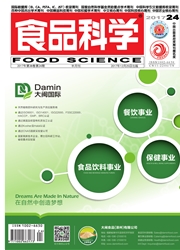

 中文摘要:
中文摘要:
以水解率、溶解度和抗氧化性为指标,考察7种常用蛋白酶(3种商业蛋白酶:碱性蛋白酶、风味蛋白酶、复合蛋白酶和4种纯化蛋白酶:胰蛋白酶、胰凝乳蛋白酶、木瓜蛋白酶、胃蛋白酶)对经过加热(90℃,5min)和碱性(pH12)处理方法所致结构展开的豌豆蛋白的酶解作用。结果表明:加热和碱性处理均能促进蛋白水解并因不同酶对溶解度产生不同的影响。两种处理方法均能有效地提高豌豆蛋白水解物的抗氧化能力。所有酶水解物的清除自由基的能力都较完整蛋白有显著提高(P〈0.05)。商业蛋白酶水解物较纯化蛋白酶水解物具有更强的螯合促氧化Fe2+的能力。风味蛋白酶和复合蛋白酶水解物具有较强的抑制脂质体氧化的能力。经加热和碱性处理的风味蛋白酶水解物较未经处理的该酶水解物具有更强的抑制吐温-20稳定的大豆油水包油乳状液中过氧化物和丙二醛反应物的生成,从而进一步证明了加热和碱性处理得到的结构展开的豌豆蛋白所制备的水解物较天然蛋白制备的水解物具有更强的抗氧化能力。
 英文摘要:
英文摘要:
Pea protein isolate (PPI) with or without structural unfolding (by heating or pill2 treatment) was hydrolyzed by using seven proteases (3 crude proteases: alcalase, flavourzyme and protamex; 4 pure proteases: trypsin, chymotrypsin, papain and pepsin) to produce pea protein hydrolysates (PPHs). The degree of hydrolysis, protein solubility and antioxidant activity were evaluated. Results showed that both heating and pill2 treatments could promote protein hydrolysis, but produce obvious changes in solubility, depending on enzymes. All PPHs exhibited stronger (P 〈 0.05) scavenging activity against ABTS~o and ~OH free radicals than PPI, and both heating and pill2 treatments of PPI enhanced the antioxidant activity of the hydrolysates. PPHs prepared by crude enzymes were stronger FeE+-chelating capacity than PPHs prepared by pure enzymes. Among all PPHs, the PPH prepared by flavourzyme (Fla-PPH) and protamex (Pro-PPH) revealed the most obvious inhibition on lipid oxidation in the liposomal system. Fla-PPH prepared from heating or pH12-treated PPIs showed better inhibition on lipid oxidation in the Tween-20-stabilized oil-in-water emulsion than Fla-PPH prepared from non-treated PPIs. Overall, PPHs from heating and pH12-treated PPIs generally has stronger antioxidant activity than those from native PPIs.
 同期刊论文项目
同期刊论文项目
 同项目期刊论文
同项目期刊论文
 The influence of Douchi starter cultures on the composition of extractive components, microbiologica
The influence of Douchi starter cultures on the composition of extractive components, microbiologica 期刊信息
期刊信息
